Post-revolutionary Ukrainian society displays a unique mix of hope, enthusiasm, social creativity, collective trauma of war, radicalism and disillusionment. With the Maidan becoming history, the focal point ‘Ukraine in European Dialogue’ explores the new challenges facing the young democracy, its place in Europe, and the lessons it might offer for the future of the European project.
This focal point stems from the project ‘Ukraine in European Dialogue’ at the Institute for Human Sciences (IWM) in Vienna. The focal point is edited by Mariia Shynkarenko at the IWM. From 2018 to 2024, it was edited by Katherine Younger, and from 2016 to 2018 by Tatiana Zhurzhenko. Further texts have been contributed by journals in the Eurozine network.

In collaboration with
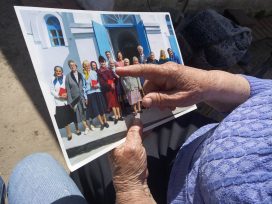
The names of us
How Russians are destroying national diversity in Ukraine
Afina, Usein, Maria, Jasim – a Greek Roumean, a Crimean Tatar, a Swede and a Turkish-Meskhetian, all from Ukraine, all living on the edge – when the attack on nationals, labelled minorities, is life-threatening, calling out the names of those who are in danger recognizes their plight and diversity.
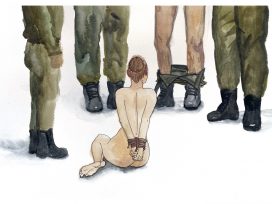
Defined by silence
The Ukrainian art that was destroyed – and the art that never happened
Ukrainian artists are struggling to invent a new language to express their experience of the war, one that goes beyond tropes and commonplaces. Some of them frantically document, others reflect in hurried sketches while on the run with their kids. Many artists don’t create at all – they are on the frontlines.
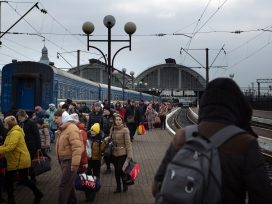
Word from those on the ground in Ukraine is coming through. And the message is – everyone who needs to leave should, but please don’t say goodbye anymore.
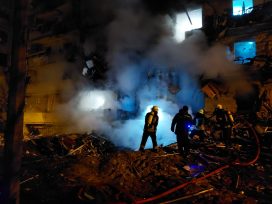
When war becomes a reality, time is of the essence. Slow political responses raise questions about underlying reasons for reluctance. And as Russia wages war on Ukraine, how the situation is described at distance also matters. How can Putin’s position be pulled back from the black hole of media and political acquiescence?
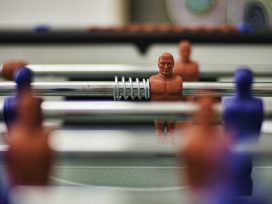
Preparing for an apocalypse
A manual from Ukraine
Ukrainians struggle to make their own voices heard over the geopolitical brinkmanship. Blitzkrieg tropes abound in international media coverage, but the people whose lives and livelihoods are at stake want to decide for themselves.
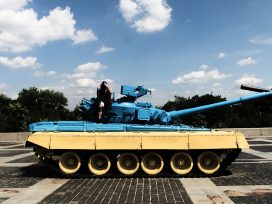
When covering the invasion of Crimea and the war in Donbas, what motivated Nataliya Gumenyuk was her conviction that journalism could influence events. But now that geopolitics rules the day, she feels powerless.
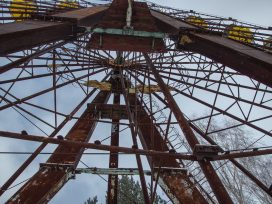
Since Ukraine’s referendum for independence in 1991, the country has seen its fair share of ups and downs. Over the past thirty years, Ukraine artists have been exploring issues of identity amongst the ruins of utopia yet have only recently gained recognition.
Prisoners of conscience
A conversation with Myroslav Marynovych
Defenders of human rights often face high stakes. When the Ukrainian Helsinki Group openly challenged the Soviet Union in the name of the 1975 Universal Declaration of Human Rights, young dissidents soon became political prisoners. The price for being a non-conformist was steep yet encouraged solidarity, paving the way to Euromaidan.
My personal history of independence
Ukraine turns 30
Under Soviet rule, Ukrainian national consciousness remained dormant and independence an unspeakable taboo. When the desire for freedom erupted, it expanded far beyond the marked route of perestroika. On the 30th anniversary of Ukrainian sovereignty, Mykola Riabchuk recounts a personal history of how independence was conceived, formed and defended.
The silent colonization of Crimea
How Russia exerts control in the annexed territories
With every step taken by the Russian authorities, the reintegration of Crimea into Ukraine becomes ever more difficult. How can Ukraine claim back rights to a territory that citizens of another country de facto own?
Walk on water
Climate change and life in Ukraine
Drought, floods and tropical night syndrome: the 2020 drought killed all crops in Bessarabia and the deepest Ukrainian lake is drying out rapidly, while the Black Sea could rise by 50 cm, displacing ¾ million people. Ukraine faces climate change already and Mariana Verbovska offers snapshots of the impacts and the efforts to mitigate them.
‘I see myself seeing myself’
Photographic experimentation in Soviet Ukraine
Amateur photographers offered a range of alternative windows on life in the USSR undercutting the dogmas of socialist realist aesthetics. Bohdan Shumylovych places the Kharkiv School of Photography under Lacan’s psychoanalytic ‘cultural gaze’.
On the debris of the Donbas
Uncovering the identity behind regional unrest
The city of Donetsk’s call for independence from Ukraine is a pivotal issue in war-torn Donbas. Its role as regional centre, at the core of the Donbas Coal Basin, upholds its weighty position. But environmental protests in Mariupol, says Yulia Abibok, show how local identity is split, perhaps irrevocably.
28 kilos of Crimea
Working with traumatic experience in art
Loss and detachment are lasting psychological issues for those displaced by war. When Crimea was annexed by Russia in 2014, the region became inaccessible to those fleeing and other nationals already living elsewhere. Artists Lia Dostlieva, Andrii Dostliev explore how ruptures in collective memory can address trauma at distance.
The price of freedom
A transatlantic conversation
At a moment that is Hamletesque in Minsk and Washington alike, Marci Shore illuminates moments of choice, and what these mean for freedom and human dignity. The following is a transatlantic conversation inspired by Ukraine, moderated by Kant and open to all.







